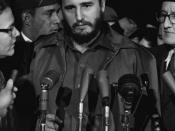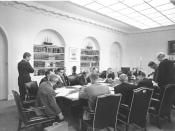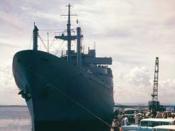JFK Saved the Day
President John F. Kennedy was faced with tough decisions during the Cuban Missile Crisis. Many of his advisors advocated a military assault on Cuba. With the power of hindsight, we now know that any type of invasion would have led to Cubans retaliating with ready short range nuclear weapons. The theory of brinksmanship and MAD (mutually assured destruction) did not seem to discourage or dissuade the Cubans, particularly Castro. JFK's decision to merely blockade Cuba and seek diplomatic solutions with the USSR proved successful and minimized risk of danger, thus it was the best choice of action.
Something had to be done in this situation, but there was, "no obvious or simple solution," (35). Throughout the Cold War, there was little risk of unprovoked nuclear attack by the USSR. Fidel Castro, however, did not hold such reservations. The fact that Castro was secretly obtaining nuclear arms was a clear and present danger to democracy.
President JFK was right to say, "Nuclear weapons are so destructive and ballistic missiles are so swift that any substantially increased possibility of their use or and sudden change in their deployment may well be regarded as a definite threat to peace," (151). The United States was only 90 miles from sites were nuclear missiles were to be launched from, giving very little reaction time.
The worst option for JFK to choose would be to do nothing, because in past wars we as a nation have learned that aggressive conduct allowed to continue unchecked leads to war. JFK did understand this, and as RFK mentioned, "He was convinced from the beginning that he would have to do something," (26). The initially popular choice, an air strike, was too much of an offensive action in this tentative situation. In hindsight, it is...


